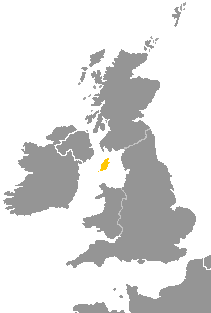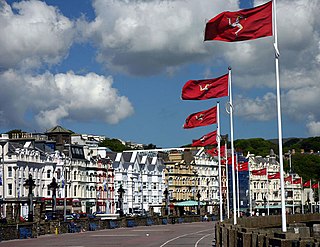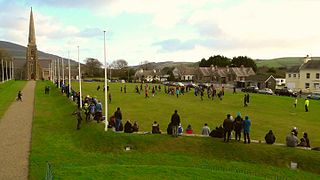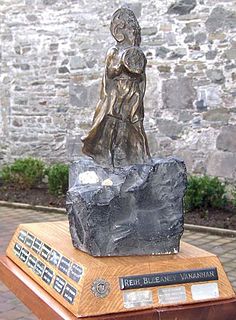Related Research Articles

The Isle of Man, also known as Mann, is an island nation and self-governing British Crown Dependency in the Irish Sea between Great Britain and Ireland. The head of state, Queen Elizabeth II, holds the title Lord of Mann and is represented by a Lieutenant Governor. The United Kingdom is responsible for the isle's military defence.

Manx, also known as Manx Gaelic or Manks, is a Goidelic language of the insular Celtic branch of the Celtic language family, itself a branch of the Indo-European language family. Manx is the historical language of the Manx people.

The "National Anthem of the Isle of Man" was written and composed by William Henry Gill (1839–1923), with the Manx translation by John J. Kneen (1873–1939). It is often referred to by its incipit, "O Land of Our Birth"..

Mec Vannin is a political party operating in the Isle of Man. Formed in 1962, it seeks to revoke the status of Man as a British self-governing Crown dependency and establish a completely sovereign state, which would be a republic.

Literature in the Manx language is known from the 16th century. Early works were often religious in theme, including translations of the Book of Common Prayer, the Bible and Milton's Paradise Lost. Edward Faragher, who published poems, stories and translations, is considered the last major native writer of the language. The historian A. W. Moore collected traditional Manx-language songs and ballads in publications towards the end of the 19th century.
The Manx are an ethnic group originating on the Isle of Man in the Irish Sea in northern Europe. Their native culture has significant Norse, Gaelic and English influences. The Manx language descends from Middle Irish.

Manx English, or Anglo-Manx, is the historic dialect of English spoken on the Isle of Man, though today in decline. It has many borrowings from Manx, a Goidelic language, and it differs widely from any other variety of English, including dialects from other areas in which Celtic languages are or were spoken, such as Welsh English and Hiberno-English.

The Isle of Man Government is the government of the Isle of Man. The formal head of the Isle of Man Government is the Lieutenant Governor, the personal representative of Elizabeth II. The executive head is the Chief Minister.

Philip Anderson Gawne, better known as Phil Gawne, is a former Member of the House of Keys for Rushen, a constituency in the Isle of Man. He also served in a number of ministerial posts on the island and is therefore a former member of the Council of Ministers.

The Cooish is the name of a festival that promotes Manx language and culture that takes place on the Isle of Man each November. The word 'Cooish' is a Manx word that has many meanings. It can translate to mean a chat, a meeting, a cause, an issue, or a get-together.

Cammag is a team sport originating on the Isle of Man. It is closely related to the Scottish game of shinty and is similar to the Irish game of hurling. Once the most widespread sport on Man, it ceased to be played around 1900 after the introduction of association football, though it has experienced a revival in the 21st century.
Thomas Brian Stowell also known as Brian Mac Stoyll was a Manx radio personality, linguist, physicist and author. He was formerly Yn Lhaihder to the Parliament of the Isle of Man, Tynwald. He is considered one of the primary people behind the revival of the Manx language.

Bunscoill Ghaelgagh is a government-run Manx-language primary school in St John's, Isle of Man that has enabled 170 children to learn fluent Manx. As of 2011 it is the only school in the world where children are taught their lessons solely in Manx and which allows children to learn the language fluently. Pupils may then go on to Queen Elizabeth II High School in Peel or to their catchment area's high school, where General Certificate of Secondary Education Manx is offered from the age of 12.

The Reih Bleeaney Vanannan is the Isle of Man's most prestigious annual award for culture. It is presented by Culture Vannin to the person or group who, in the opinion of the panel of assessors, has made the most outstanding contribution to Manx culture. It is officially presented by the President of Culture Vannin, normally in January each year.
Aeglagh Vannin was a youth group in the Isle of Man whose purpose was the engagement with and revitalisation of Manx language, history and culture. It was established by Mona Douglas in 1931, went through a number of mutations, and faded out in the 1970s. It is best remembered for its central role in the revival of Manx folk dancing.

Culture Vannin is the trading name for the Manx Heritage Foundation, established in 1982 by the Isle of Man Government to promote Manx culture, heritage and language. It was rebranded in February 2014, having previously been known as the "Manx Heritage Foundation", since the former title "held connotations more towards the cultural history of the island" which were not felt to be accurate to the organisation's progressive approach to invigorating Manx culture. Culture Vannin's motto is "Taking our culture forward".

Yn Çheshaght Ghailckagh, also known as the Manx Language Society and formerly known as Manx Gaelic Society, was founded in 1899 in the Isle of Man to promote the Manx language. The group's motto is Gyn çhengey, gyn çheer.
Claare ny Gael is a bilingual radio show presented by Robert Corteen Carswell and broadcast on Sunday evenings each week on Manx Radio.
Edmund Evans Greaves Goodwin was a Manx language scholar, linguist, and teacher. He is best known for his work First Lessons in Manx that he wrote to accompany the classes he taught in Peel.
Doug Fargher also known as Doolish y Karagher or Yn Breagagh, was a Manx language activist, author, and radio personality who was involved with the revival of the Manx language on the Isle of Man in the 20th century. He is best known for his English-Manx Dictionary (1979), the first modern dictionary for the Manx language. Fargher was involved in the promotion of Manx language, culture and nationalist politics throughout his life.
References
- ↑ Gawne, Phil. "Securing the Future of Manx Gaelic". http://www.poileasaidh.celtscot.ed.ac.uk/gawneseminar.html Retrieved 17 July 2020
- 1 2 3 Cain, Adrian (2017). "Coonceil ny Gaelgey: 2017-2021" (PDF). Learn Manx. Archived (PDF) from the original on 16 November 2018. Retrieved 19 July 2020.
- ↑ "Manx Language". Culture Vannin. Archived from the original on 17 July 2020. Retrieved 19 July 2020.
- ↑ "Chyndaayssyn - Translations". Learn Manx. Archived from the original on 15 July 2020. Retrieved 11 November 2020.
- ↑ "The Manx Language Strategy 2017-2021" (PDF). Culture Vannin. 1 October 2017. Archived (PDF) from the original on 2 February 2018. Retrieved 19 July 2020.